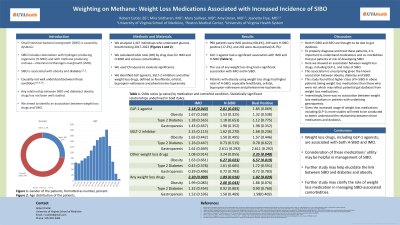Monday Poster Session
Category: Functional Bowel Disease
P2356 - Weighting on Methane: Weight Loss Medications Associated With Increased Incidence of SIBO
Monday, October 28, 2024
10:30 AM - 4:00 PM ET
Location: Exhibit Hall E

Has Audio

Robert Cutler, BS
University of Virginia School of Medicine
Charlottesville, VA
Presenting Author(s)
Robert Cutler, BS1, Mira Sridharan, MD1, Mary Sullivan, MD2, Amy Doran, MD2, Jeanetta Frye, MD3
1University of Virginia School of Medicine, Charlottesville, VA; 2University of Virginia, Charlottesville, VA; 3University of Virginia Medical Center, Charlottesville, VA
Introduction: Small intestinal bacterial overgrowth (SIBO) has been associated with obesity and diabetes. The relationship between medications used to manage these conditions and SIBO remains poorly understood. This study aims to identify an association between weight loss medications and SIBO prevalence.
Methods: This is a retrospective case-control study among patients who underwent SIBO glucose breath testing at a single center between 2017 and 2023. We calculated the odds ratio (OR) by medication category for intestinal methanogen overgrown (IMO) and hydrogen SIBO (H-SIBO). We further evaluated the OR by comorbid obesity, type 2 diabetes, and gastric emptying study results. Chi square test was used to evaluate the significance of each combination.
Results: We identified 1,447 individuals who had undergone SIBO lactulose breath testing. Of these, 990 were IMO positive, 249 were H-SIBO positive and 242 were positive by both criteria. GLP-1 usage was associated with IMO (OR 2.18, 95% confidence interval 1.01-4.72) and H-SIBO (OR 2.01, 95% confidence interval 1.04-3.88) positivity. Additionally, use of any weight loss drug at time of testing was associated with an increase for IMO (OR 2.20, 95% confidence interval 1.20-4.06) and H-SIBO (OR 1.89, 95% confidence interval 1.11-3.22). Among patients with obesity, use of any weight loss drug was associated with higher rates of H-SIBO (OR 2.00, 95% confidence interval 1.01-3.95). Use of less common weight loss medications (fenofibrate, orlistat, bupropion-naltrexone and phentermine-topiramate) among patients with obesity had an OR 6.27, 95% confidence interval 1.03-38.16).
Discussion: Both IMO and H-SIBO are associated with the use of GLP-1 agonists, as well as with the use of weight loss medications as a class. Given the previously recognized correlation between diabetes, obesity and SIBO diagnosis, this association is not necessarily unexpected. However, there is also an independent association of increased H-SIBO diagnosis among obese patients using weight loss medications. Careful consideration of the utility of these medications may be helpful in management of patients with SIBO. The correlations observed here are preliminary and must be further studied as we strive to understand their role in managing SIBO-associated comorbidities.
Note: The table for this abstract can be viewed in the ePoster Gallery section of the ACG 2024 ePoster Site or in The American Journal of Gastroenterology's abstract supplement issue, both of which will be available starting October 27, 2024.
Disclosures:
Robert Cutler, BS1, Mira Sridharan, MD1, Mary Sullivan, MD2, Amy Doran, MD2, Jeanetta Frye, MD3. P2356 - Weighting on Methane: Weight Loss Medications Associated With Increased Incidence of SIBO, ACG 2024 Annual Scientific Meeting Abstracts. Philadelphia, PA: American College of Gastroenterology.
1University of Virginia School of Medicine, Charlottesville, VA; 2University of Virginia, Charlottesville, VA; 3University of Virginia Medical Center, Charlottesville, VA
Introduction: Small intestinal bacterial overgrowth (SIBO) has been associated with obesity and diabetes. The relationship between medications used to manage these conditions and SIBO remains poorly understood. This study aims to identify an association between weight loss medications and SIBO prevalence.
Methods: This is a retrospective case-control study among patients who underwent SIBO glucose breath testing at a single center between 2017 and 2023. We calculated the odds ratio (OR) by medication category for intestinal methanogen overgrown (IMO) and hydrogen SIBO (H-SIBO). We further evaluated the OR by comorbid obesity, type 2 diabetes, and gastric emptying study results. Chi square test was used to evaluate the significance of each combination.
Results: We identified 1,447 individuals who had undergone SIBO lactulose breath testing. Of these, 990 were IMO positive, 249 were H-SIBO positive and 242 were positive by both criteria. GLP-1 usage was associated with IMO (OR 2.18, 95% confidence interval 1.01-4.72) and H-SIBO (OR 2.01, 95% confidence interval 1.04-3.88) positivity. Additionally, use of any weight loss drug at time of testing was associated with an increase for IMO (OR 2.20, 95% confidence interval 1.20-4.06) and H-SIBO (OR 1.89, 95% confidence interval 1.11-3.22). Among patients with obesity, use of any weight loss drug was associated with higher rates of H-SIBO (OR 2.00, 95% confidence interval 1.01-3.95). Use of less common weight loss medications (fenofibrate, orlistat, bupropion-naltrexone and phentermine-topiramate) among patients with obesity had an OR 6.27, 95% confidence interval 1.03-38.16).
Discussion: Both IMO and H-SIBO are associated with the use of GLP-1 agonists, as well as with the use of weight loss medications as a class. Given the previously recognized correlation between diabetes, obesity and SIBO diagnosis, this association is not necessarily unexpected. However, there is also an independent association of increased H-SIBO diagnosis among obese patients using weight loss medications. Careful consideration of the utility of these medications may be helpful in management of patients with SIBO. The correlations observed here are preliminary and must be further studied as we strive to understand their role in managing SIBO-associated comorbidities.
Note: The table for this abstract can be viewed in the ePoster Gallery section of the ACG 2024 ePoster Site or in The American Journal of Gastroenterology's abstract supplement issue, both of which will be available starting October 27, 2024.
Disclosures:
Robert Cutler indicated no relevant financial relationships.
Mira Sridharan indicated no relevant financial relationships.
Mary Sullivan indicated no relevant financial relationships.
Amy Doran indicated no relevant financial relationships.
Jeanetta Frye indicated no relevant financial relationships.
Robert Cutler, BS1, Mira Sridharan, MD1, Mary Sullivan, MD2, Amy Doran, MD2, Jeanetta Frye, MD3. P2356 - Weighting on Methane: Weight Loss Medications Associated With Increased Incidence of SIBO, ACG 2024 Annual Scientific Meeting Abstracts. Philadelphia, PA: American College of Gastroenterology.
